#zuko defense squad
Explore tagged Tumblr posts
Text


Stop putting them against eachother 😭😭 THEY ARE LITERALLY BEST FRIENDS
- (obviously NOT ship art)
#atla#avatar the last airbender#avatar#bun draws#atla fanart#avatar creator#zuko#avatar zuko#atla zuko#zuko art#zuko meme#zuko fanart#prince zuko#aang fanart#the legend of aang#atla aang#aang art#zuko and aang#aang and zuko#aang and zuko friends#aanglove#avatar aang#aang#aang defense squad#zuko defense squad#friends#avatar art#atla art#atla meme#avatar meme
260 notes
·
View notes
Text




I bet whoever made this is a Kataang shipper, I have seen this trend starting where some Kataang shippers now act like Zuko didn’t really change for the better and will talk about how he is so much like his father. Funny how before everyone agreed that Zuko had an amazing redemption arc, but now that some Kataang shippers see him as a threat to his OTP, they act like he didn’t go through a redemption arc.
57 notes
·
View notes
Text


"i haven't watched atla or interacted with the fandom in a bit so my memory is a bit hazy" your post could've just ended there because it's clear that you don't understand zuko's character at all. zuko never demanded forgiveness nor was he easily forgiven. in "the western air temple", the episode where zuko joins the gaang, majority of the group (excluding toph) are hostile to the idea him joining the group and he accepts that they don't want him to join. it isn't until he helps them fight combustion man that he is accepted into the gaang. even when he's allowed to join the group, some of the characters are still hostile to the idea of him being in the group, mainly katara, who threatens to kill him if he hurts aang; zuko and katara don't even become friends until "the southern raiders". this isn't even a case of low media literacy, this is just being loud and WRONG.
57 notes
·
View notes
Note
what do you think of the argument some people make that goes along the lines of "zuko was acting entitled towards kataras forgiveness and the betrayal at the catacombs was just a second thought to him"? According to them, zuko failed to understand that kataras anger at him was a direct consequence of his previous decisions and instead blames it on her resentment against the fire nation (the whole "i think she sees me as her mother's murderer" spiel). They also claim that he's a raging misogynist bc of the way he treated katara in the pirate episode, that he didnt remember her name when asking sokka abt the southern raiders, taunting her in the northern tribe by saying she is a big girl now that she's learned some new tricks, referring to the kyoshi warriors as a "bunch of little girls", yelling at mai and acting possessively, mocking ty lee... amidst many other things, including the toxic masculinity accusations ofc. They also condemn his selfishness in helping katara find some semblance of closure. I think a great part of this is just biased hate, but i just wanted to know your opinion. It's okay if you don't want to answer though!
Oh no of course, I think it’s definitely biased hate, because these kinds of superficial “criticisms” only seem to come up in response to people shipping Zuko with the incorrect character. I’ve seen the same people who make these arguments praise Zuko, say they love him, say his redemption is inspiring, etc. in other contexts.
There is a lot to unpack here, but I’ll touch on all these points because I find them interesting. Also, in regards to generally stupid anti Zuko takes from whiny anti shippers, a lot of those came up here which I addressed in detail.
Now, about these particular arguments.
1) Zuko wanted Katara’s forgiveness out of selfishness
Firstly, I never understood this take because in context…Zuko already has what he set out to get when he left the Fire Nation at the beginning of The Southern Raiders. Actually, let’s take a step back here: leaving the Fire Nation. Did these people collectively forget that? Zuko could have stayed in his life of luxury, watched the world burn, and inherited the title of Emperor from his father. But instead, he committed treason, risking his life in the process, because he knew in his heart it was the right thing to do. This is the character you’re trying to smear as a selfish monster?
Anyways.
The Southern Raiders. The scene which kicks off the conflict with Katara is when the group is sitting around the fire, praising Zuko for his heroism and saving them from Azula. He humbly admits he doesn’t feel he deserves the praise, to which Katara agrees and storms off. But the important piece of context here is that everyone else—including Sokka, Katara’s own brother—seems to be on Zuko’s side. If Zuko was purely selfish, he wouldn’t have cared what Katara thought of him. He could have laughed along with Sokka and agreed that Katara was just being dramatic. But that isn’t what happened.
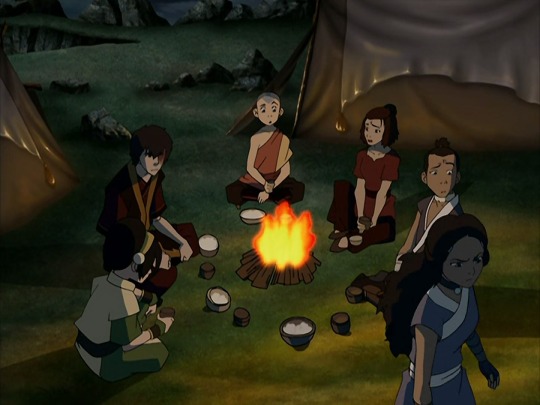
Zuko doesn’t look angry or vindictive here; he looks hurt. He cares what Katara thinks of him; he later says those words verbatim to Sokka.
I also think the fact that Zuko made a special effort to reach out to Katara above the other characters shows that he recognizes that the catacombs incident was much more personal for Katara. Zuko even acknowledges this himself.
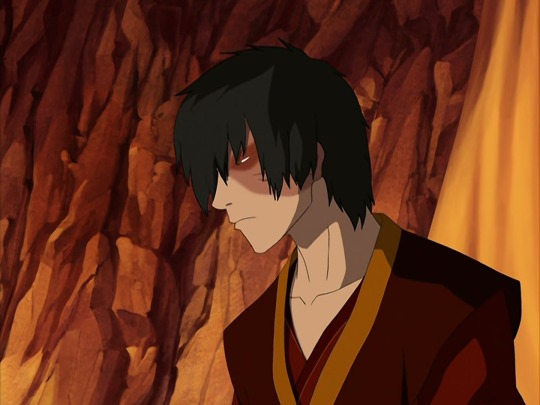
Zuko: Katara mentioned it before when we were imprisoned together in Ba Sing Se, and again just now when she was yelling at me. I think somehow she's connected her anger at that to her anger at me.
Zuko remembers their conversation very well. Katara’s anger towards him was different than the others because she felt betrayed on a more personal level. She shared something deeply personal with Zuko and connected with him, and felt deceived when he betrayed her.
In Katara’s mind, Zuko talking about his mother was fake. She tells herself it was just him lying to her and manipulating her to gain her trust, because that’s easier than the idea that he didn’t care. I believe this is why Zuko finds it so important to make it up to her…and specifically why her mother was involved. Obviously Zuko was wrong to side with Azula. But he wasn’t being manipulative or uncaring. He was manipulated himself by Azula, the person who knows how to control him better than anyone else.
So, in this episode, Zuko is not setting out to prove that he’s “good” (he’s already done this); he’s setting out to show Katara that he does respect her trauma, he does understand and respect the weight of what she told him about her mother. Zuko can tell she’s deeply hurt and that he’s part of that hurt. That’s why he wants to demonstrate that his care for her was and is genuine. He never lied to her. And that right there is the opposite of selfishness. This is once again Zuko acknowledging his own faults and taking responsibility for fixing them. He doesn’t even seem to demand or expect forgiveness in the end.
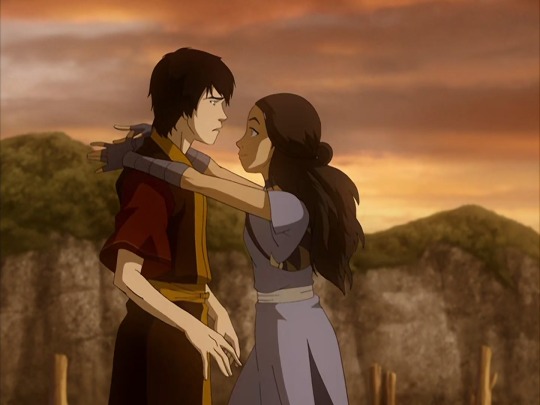
Look at his face. He’s surprised. He did not expect this gesture, although he graciously accepts it.
If Zuko was this selfish, entitled monster people want him to be, he wouldn’t react this way. He wouldn’t even care about any of the points I just went through.
If you honestly believe that Zuko’s motivation was selfish and he was just manipulating Katara’s feelings this whole time, you fundamentally missed the point of one of the show’s most critically acclaimed episodes.
2) Zuko didn’t know Katara’s name (?)
This one is just stupid. I’m sorry. I didn’t know people actually used this argument because it originated as a joke post and you should be embarrassed if you genuinely think this is canon. It comes from the scene in The Southern Raiders where Zuko says “your sister” rather than “Katara” when asking Sokka about their mother.
There is absolutely nothing about this scene indicating that Zuko doesn’t know Katara’s name. The word choice is most likely to emphasize the sibling relationship between Katara and Sokka to explain both to Sokka and to the audience why Zuko sought him out specifically.
And think about it. Zuko has been hanging around 24/7 with them for probably two weeks at this point. There is no way he didn’t catch Katara’s name, if he didn’t already know it. And given how diligent he was in his Avatar hunting days, he most likely did already know it.
3) The pirate episode
Okay I’ve said this before and I’ll say it again…I’m so tired of people projecting some weird, creepy sexual undertones onto this episode. There was absolutely nothing abusive or misogynistic about the character interactions here. It was a very standard (and honestly a bit cheesy) example of a cartoon villain and hero interaction. The fact that you see a female character in any kind of distressed situation and immediately project sexual implications onto it is the real misogyny here. I never see people complain about similar scenes involving male characters:

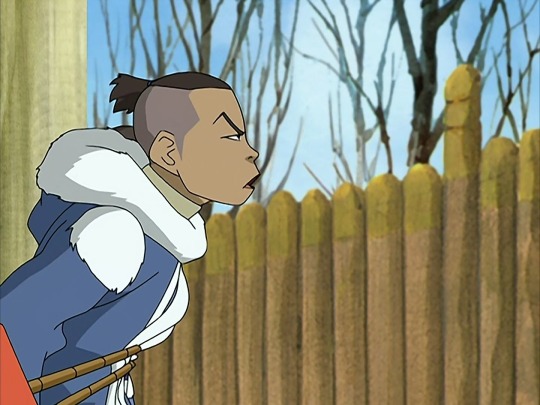
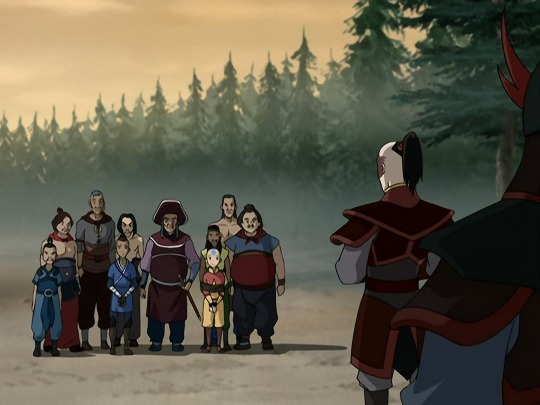
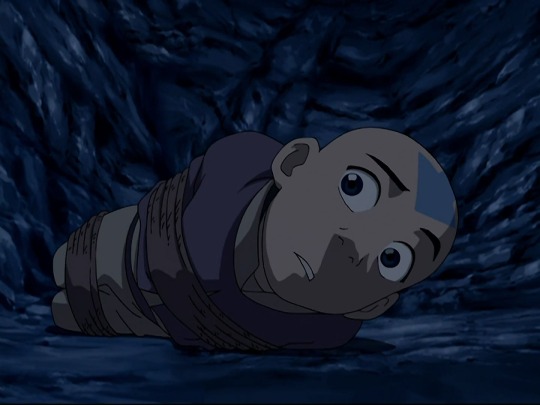
I could dig up even more examples but can you see my point? The argument that there was any abuse or sexual misconduct on Zuko’s part this episode is absolutely misogyny—but it’s audience misogyny; not Zuko’s. The canon scene would have gone exactly the same way if Katara was male. The only difference would be much fewer disgusting sexual over-analyzations of it by fans.
4) “Little girls”
For this one, an important piece of context to keep in mind is that this script was written in 2005 by a creative staff of mostly men. So we need to ask the question, is this meant to reflect misogyny on Zuko’s part, it is it the bias of the writers?
Another prime example of this is Iroh’s interactions with Jun. Obviously, that was severely creepy behavior and absolutely misogynistic. However, most fans (including myself) tend to overlook that. Why? Because it’s jarringly inconsistent with the rest of Iroh’s character and his purpose within the narrative. In context, it’s pretty obviously something the writers thought was “funny” at the time but aged like rotten milk.
Also, in regards to sexist language during fights, consider all the stupid lines like…
Azula: Who are you? The Avatar’s fan girls?
Ty Lee: You are not prettier than we are.
…in the Kyoshi Warriors vs. Dangerous Ladies fight. Seems like this is just a writer bias issue, personally. When have men ever been normal about teenage girls? Right—never.
I get this is a slippery slope, so my approach is to compare Zuko’s lines like this to everything else we know about Zuko and ask the question: is there anything about Zuko’s character that indicates he views women as inherently inferior or lesser?
Well, no.
You know what is a trend for Zuko? He focuses on putting down his opponents by acting like they’re younger and weaker than him. His first reaction to Aang is “you’re just a child.” This is consistent with his attitude towards Katara and the Kyoshi Warriors. Zuko canonically treats male and female opponents no differently. He fights and moves on. No creepiness, nothing like Iroh and Jun, etc. If they were male, it wouldn’t have gone differently. That’s why I think it’s a reach to say these comments by themselves indicate a misogynistic attitude.
Besides, why would Zuko see women as weaker and lesser when this is who he grew up with?
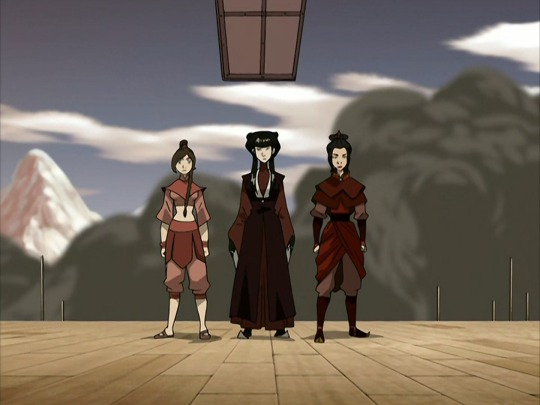
That’s another thing. For as much anger and resentment Zuko harbors for Azula on the basis that she’s Ozai’s favorite and born lucky—not one comment is made about her sex. If Azula was male, nothing would inherently change about this dynamic. So yeah, I’m not really buying this whole “Zuko is a misogynistic incel” narrative. If you’ve ever dealt with incels in any capacity, you know they’d absolutely jump at the opportunity to whine that their (female) sister is so much more lucky and privileged and loved compared to them.
5) Zuko, Mai, and The Beach
I’m working on a longer analysis of this but to summarize…people on both sides blow this issue way out of proportion. Mai wasn’t abusive. Zuko wasn’t abusive. They were a pretty standard angsty teenage couple having angsty teenage drama. Zuko called Mai a big blah and shoved some dude into a vase. Mai told him he was out of control. That’s literally such a minor issue, that they resolved by the end of the episode.
But to dig into this more, consider the point this is in Zuko’s story. He’s at rock bottom. The premise of the entire episode is to show how abnormal and out of place Zuko feels among people who should be his peers. His issues with Ruon-Jian aren’t even about Mai to start. Zuko was beefing with this dude before the party even started, remember?
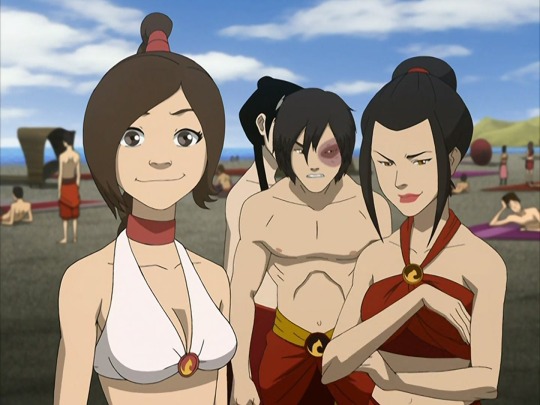
Why is Zuko mad at him? Because he’s making Zuko feel freakish. He’s making Zuko feel like he once again is an outcast, and Zuko hates that. He’s insecure. That’s…the point of the episode.
I’m not going to excuse his tantrum over Ruon-Jian talking to Mai, because that was toxic, but consider the context. Zuko isn’t some crazy possessive freak. In his mind, this is just icing on the cake, another example of why he’s an antisocial freak compared to other Fire Nation teens and he hates how it makes him feel.
But interestingly enough, I do think Mai and Zuko’s interactions in that scene give some insight into their dynamic and Zuko’s character—believe it or not, in a positive way. Just consider the context and body language.
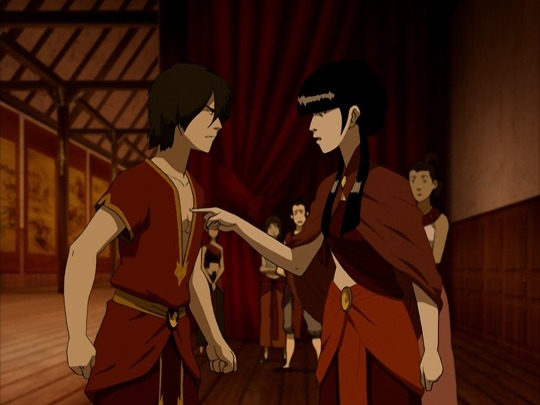
I’m just stating facts here. Zuko is more physically threatening than Mai. He’s bigger, stronger, male, and he’s a firebender while she isn’t a bender. And yet, Mai has absolutely no trouble getting in his business to tell him off. Why? You can argue that it’s just because she thinks she could knife him—but we’ve seen how she reacts to an actual physical threat (Azula) and it isn’t like this at all. Mai is confident because she knows Zuko wouldn’t physically harm her. He’s angry, but he never once uses his figure to physically intimidate her. He clearly doesn’t make a habit of this behavior either judging from Mai’s reaction. Also think about the fact that the only physical altercation here is between Zuko and another man. The primary target of his anger isn’t the woman he’s allegedly acting possessive over unlike another character in the Ember Island Players and several comics…
Not to mention the way they reconcile around the fire. Zuko’s behavior doesn’t at all reflect an angry, entitled misogynist who thinks he owns his girlfriend. Quite the opposite. He clearly holds a lot of love and respect for her. It’s just that…this episode is literally displaying Zuko at his most tortured, his most self-hating, his most insecure as he realizes he no longer has a place in the home he’d desperately been chasing for years after being brutally mutilated and banished. With that in mind, I think he actually handled himself very well.
The thing about Zuko is that he takes accountability for his wrongs and works to improve himself. He has flaws and even when they’re understandable, he still takes responsibility for fixing them. That’s the trait of his that sets him apart from…certain other characters.
6) Zuko being rude to Ty Lee
Again, see above. Yes, Zuko was mean to her. But again, this is Zuko at rock bottom. This is Zuko venting his frustration about nobody being able to understand what he’s gone through and how isolated and freakish he feels. None of them had their faces burnt off in front of an audience. None of them were banished and forced to live as refugees. Zuko blew up at Ty Lee in the first place after she made a comment about bad skin.
Like yes, he’s rude, but did you miss the point of that episode? If you think this has anything to do with misogyny you’re just delusional, sorry. That interaction had nothing to do with Ty Lee being female. It had to do with her (and every other character that episode) living a privileged lifestyle while Zuko is (literally, too) feeling the weight of the scars his trauma has left him with.
So in conclusion, yes, I really think these takes are all shallow and unfounded jabs at Zuko’s character that either don’t understand or outright ignore critical parts of his development and story. And considering I’m #canceled for my based misandry in many circles, it should say a lot that I’m defending a man of any kind ✌️
#zuko#mai#zutara#maiko#atla#zuko defense squad#aang critical#canon critical#the beach#the southern raiders#ask#anon#meta
77 notes
·
View notes
Text
My thoughts on Zuko:

I hate when people say(*creators*) when zuko is an emo moody bad boy. When zuko acts "emo" and "moody badboy" as they say it's him reacting to his trauma and abuse as a kid/prince(most of time. Zuko is still badass. But badboy no). Is it an excuse? No. But when zuko is acting that way in canon, his obsession with honor, his yelling, his moodiness, his spoiled behavior, his short temper, his hurting and following the gaang and the avatar. That is the product of having his empathy literally beaten/burned out of him by his father(and mocked and emotionally abused by Azula) and growing up in the fire nation palace. The reason Zuko is doing this whole thing is because he wants to please his father. Become someone he's not. His struggle of who his father wants him to be with who he actually is. It's because of the abuse of his father and his family. As the series goes on you get more and more flashes of the person Zuko was and the person he can become. By the end of the series it's such a great contrast and Zuko is much more happier because he's with the gaang. His family. He got out of that abusive situation he was in and finally became himself. A dorky, empathetic, caring, skilled swords men/firebender, a balanced person. Does he still have moments of anger? Yes. But over all Zuko becomes a fully balanced better person. And I hate when people degrade his character down to "Oh he was a moody emo hot head." I hate when people forget that abuse is not pretty. Especially for a young child. And that affects how they act around people as they growup. Abuse victims are not all going to all act like Cinderella in the face or aftermath of their abuse. There's no perfect victim. It takes them a long time to be better and they are going to make a lot of (awful) mistakes like Zuko did. Why I love his character.

@thevictorianghost
(Don't like don't read. Post hate and I'll block you)
#zuko#atla#avatar the last airbender#tw abuse#tw child abuse#tw childhood trauma#tw emotional abuse#zuko defense squad
36 notes
·
View notes
Note
@thevictorianghost I don't understand how zuko hate can even exist. Did you even watch the same show?
Why does hating Zuko and willfully misinterpreting his character seem to be the trendy new thing to do in this fandom?
Oh my godddd!!!!!! The mere fucking THOUGHT of Zuko slander makes my blood boil why do you do this to me lmaoo. But, as I’ve mentioned earlier, I would see this stuff in the tags just when I joined the fandom and didn’t realise that there is a slight possibility that someone could not adore Zuko with every fibre of their being. I see people refute them on my dash from time to time, but I just scroll past any stupid ass i-hate-zuko takes because I simply refuse to subject my eyeballs and brain to that nonsense.
The TL;DR version is: The hoops people need to jump through to justify ‘zuko was bad actually’ is exhausting. It’s such a stupid take, that disproving it requires you refuting so many untruthful interpretations of the source material, it’s almost impossible to untangle all the knots in their logic. (Also, I don’t wanna act like fiction and real-life have one to one parallels, but since antis like to pretend that it does, I figured I could take a few shots at the British Empire.)
Rest of my thoughts below the cut.
I gather that this is a new phenomenon, since the resurgence of the show’s popularity. I feel like it’s a result of younger people watching it now, who grew up with the internet and cancel culture (I don’t completely disagree with cancel culture, I just think there’s a very clear line that it frequently crosses). By that I mean, this mindset that if anyone has or has associated with someone who has said or done something vaguely not PC, they are a bad person forever now. This is a much more complex topic, and I do not think the intent behind the current mindsets are bad, quite the opposite. But no one seems to want to strike a balance anymore or view anyone or any piece of media with any kind of nuance. It’s the thought process of ‘since this book has racism, it is condoning it’ like no, maybe sometimes a book has racism because it is about racism and is trying to portray the horrors of human society.
There also seems to be a new take on the 2010s Tumblr hipster attitude of ‘i liked it before it was cool’ to ‘anything popular is probably not that good so we must drag it to hell and back even if that means distorting the actual themes and writing and disregarding context’. Personally, I don’t even think ATLA is as good as everyone told me it was, it has a lot of shit writing moments (on top of the uncomfortable racism and misogyny, but it was another time, so the standards were different), but I DO think it’s an overall enjoyable show and Zuko is one of the most perfectly written characters to exist (barring 2 very specific moments but we don’t need to get into that right now). Have we considered that maybe, just MAYBE, the reason Zuko is so widely considered to be such a great character is simply because he IS. Not every popular opinion is a good one, but a lot of them are popular for a reason. You don’t even have to particularly like Zuko, but if you cannot see the absolute beauty in his character and his journey, then I just don’t trust you.
I am an extremely character-driven person. I still maintain that had Zuko not been on the show, I never would’ve finished it. Zuko starts as a bratty hot-headed prince but here’s the really important thing. He’s shown in a very sympathetic light almost right away. E3 (or whenever that bitch Zhao shows up) all we’ve seen so far is Zuko trying to capture our protagonists and throwing temper tantrums, but you still feel for Zuko. My partner and I looked at each other after that episode and were both like ‘so they’re clearly setting him up for a redemption arc right’ (and we knew nothing going into the show idk how I'd avoided spoilers). They make it pretty obvious that he’s been through some shit and I think Zhao was a very clever idea. This is some old man in a position of authority over Zuko, mocking him for being a disappointment. It’s clearly unfair, and it’s just another Fire Nation imperialist who thinks Zuko is worthless because he has a conscience, probably. Zuko is consistently put in these positions of powerlessness, interspersed with flashbacks from his past, and he consistently pushes against it. He fights against it all and tries to regain some amount of control over his life.
The thing about anti-Zuko arguments is that it requires you to flat out pretend that a lot of the explicit dialogue on the show didn’t happen. Since this was a show targeted at kids, they go out of their way to say the key defining moments out loud. Ffs Iroh is literally just there to spout words of wisdom for Zuko so that his journey is made even clearer. The most common argument tho, I presume, is the one that Zuko personally is a coloniser and let me just heavy sigh do y’all even know what words mean anymore? Look, I’m the first person to jump on the ‘fuck colonisers’ train. Like, I constantly shit on the British. Trust me, I get it. But here’s the thing. I don’t actually think that every individual British person is a coloniser. Do y’all see the fucking difference????? The country absolutely is, and I will continue to hate their guts till they have the decency to accept what they did and pay for it, but most of the common people are not.
This btw is also a theme on the show. Multiple times. Hama’s (I have thoughts on how she was treated, but that’s not relevant rn) whole thing was exactly this. She was an actual victim of the Fire Nation’s cruelty, but her wanting to take that out on the FN citizens was wrong. For exactly this reason. You can’t help where you were born. Katara, the person antis love claiming was the biggest victim of the FN’s imperialist agenda and hates them SO much, goes out of her way as the Painted Lady to protect their citizens. Like. People see this right? They understand that Katara, the person who hates the FN so much for taking away her mother, still gets this distinction and acknowledges that the people responsible are only the ones who are actively colonising and killing people.
Anyway, I can bet the follow up to this argument is ‘but Zuko was Fire Nation royalty’ and I repeat. You can’t help where you were born. I know people are gonna point to S1 Zuko but again, nothing he does is out of malicious intent or for the betterment of the Fire Nation’s rule. People joke about how Zuko screams about ‘honour’ and then just completely miss the point of it. He was a child fighting to get his dad’s approval. He even says this out loud multiple times. He doesn’t get the horrors of colonialism, because he was raised in the FN. Do people just not remember his monologue when he’s confronting Ozai???? They explicitly tell us that the FN lies to their kids to make them believe that they are the greatest country. And he was raised in the actual palace, where would he have gotten any information to the contrary???? There are grown-ass adults with complete access to the internet out there who still believe that Winston Churchill was a great man and not a white supremacist because that’s the garbage narrative the West feeds y’all but a child raised in the royal family of a colonising nation who didn’t realise the lies until he left home is the idiot. Okay.
Now, had Zuko gone out of his way to torment people, simply chosen not to care, or was too scared to fight against them, that would be a whole other story. And funnily enough, these traits all exist in other characters - Azula, Mai, Ty Lee. Azula is also a child of abuse and I think it’s clear from the flashbacks that she always had a streak of cruel, but she was groomed by Ozai, Ursa didn’t seem to give Azula the same kind of attention and love that she gave Zuko, she didn’t have Iroh to guide her as a teenager, so she simply did what came naturally to her and promoted the FN agenda. Mai also comes from a high ranking family that is very much on board with the whole ‘Fire Nation First’ rhetoric and she helps, but only because she is apathetic. That’s her whole thing, she just doesn’t care. And when Zuko leaves, she calls him a traitor, so she clearly is loyal to her country to a fault (again, she was a kid who didn’t have someone to tell her better, I’m not hating on her). Ty Lee I think is closer to the representation of a citizen or maybe a soldier. They don’t explore this thread (a wasted opportunity imo) but in her introduction, it seems that she has no interest in this war and only ends up joining because she’s scared of Azula. It’s her way of survival. She knows she can’t take a stance against Azula and escape unscathed.
I think Zuko at some point goes through all these stages, but he is by nature, more caring, a fighter, and he makes his own destiny. Remember, that thing that’s said out loud???? Zuko’s journey is so incredible because he has to confront all the lies he’s been fed and the hand he may have had in the destruction, as collateral or via complicity, head-on. He has to live in the Earth Kingdom and listen to people talk about what they’ve been through and he is clearly horrified. He tries to protect them and when they find out who he is, they turn on him. I love this choice actually (as much as I hate to see Zuko hurt) because clearly, the show itself is aware that Zuko just claiming that he’s not like other Fire Nation royals isn’t enough for him, or for others. Zuko has to work his butt off to get anybody’s approval (re, the Gaang) because of course people are gonna be sceptical of him.
He has a bumpy road to redemption which is what I fucking loveee because life is messy, and your journey to being a better person is going to be too. You can’t expect yourself to just have a linear trajectory from Point A to Point B, because are people familiar with the concept of humanity. It’s going to look more like a bunch of messy scribbles and you’re always gonna mess up and I cannot stress how much I ADORE that they wrote that into his arc. You can do some dumb things but aren’t beyond forgiveness. BUT. They also acknowledge that just because you’re sorry now, doesn’t entitle you to someone’s forgiveness now, or later. And Zuko doesn’t expect it so he works tirelessly towards making amends. He goes above and beyond and he still doesn’t think he’s worthy of being forgiven all the time (like when he’s nervous to go see Iroh).
AND (oh my god there’s so many ands but he’s such a complex character and there are so many layers to his redemption I’m sorry I’m gushing) most importantly. He takes a fucking stand against the Fire Nation. He does all these things till he finally makes his way back home. He thinks this is what he wanted, he has his father’s approval, he’s got his honour back, he’s the crown prince, he has a FN girlfriend...so then why is he unhappy? (Again, these are literally his words asdfghjkmhngbfds.) Because he has changed. Because he actively disagrees with their ideologies now. Before he was banished, he clearly didn’t agree with their ways, but now he doesn’t want a part in it. We see his empathy and inner conflict again when Ozai asks his opinion on taking over the Earth Kingdom. See how that works? He had every chance to be a colonising little shit, but he didn’t take it.
I can’t believe the amount of strength it took for Zuko to walk away from this life of comfort and prestige, face off against that abusive dickhead who calls himself a father, and then just...join the “enemy” to defeat them. And he wants to defeat them because he hates what they stand for on a FUNDAMENTAL level. Seriously, did people just turn off the volume during that scene in The Day of Black Sun? This is what I mean by blatantly ignoring the dialogue to come to these conclusions. Zuko, as a fucking teenager, had the courage to fight against his own family because he believed the world could be a better place and he recognised that that meant his own family needed to be defeated. He was literally willing to die to take them down and protect the people that he cares about, good GOD I cannot deal with this. That’s more than any Brit ever did, but go off. I guess by this logic, no irl white person is allowed to be happy ever, because y’all probably have some ancestor who colonised a country or was a slave owner or something, sorry. Oh, also, antis who love harping on about Zuko’s ancestors and family - did they also forget that he’s the literal descendant of Roku too? You know, the Avatar, the guy who tried to fight and stop Sozin too? Or does that just not fit their narrative, so they decided to only pick the parts of his lineage that do?
#pro zuko#if you come for zuko i WILL lose my shit#zuko#zuko defense squad#atla#avatar last airbender
181 notes
·
View notes
Text

Lady of the two lands
#atla#zutara#avatar the last airbender#katara#fanart#zuko x katara#my art#digital art#art#the only character i love blindly is katara#katara defense squad
473 notes
·
View notes
Text
Katara has every right to be angry at Zuko...
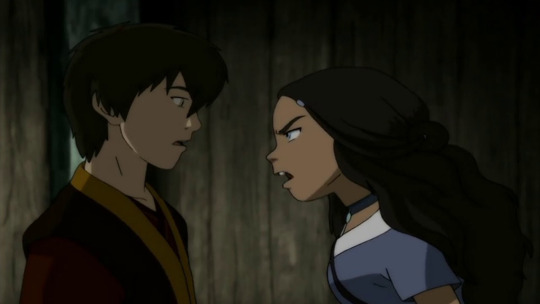
... he may not have been the one that tried to destroy Aang, but he joined that person's side...
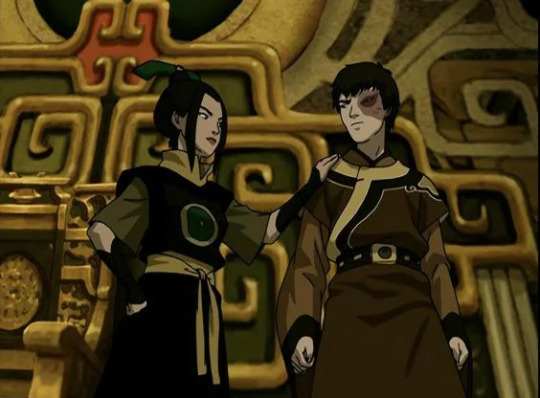
... and the spirit water that Katara used to heal Aang...
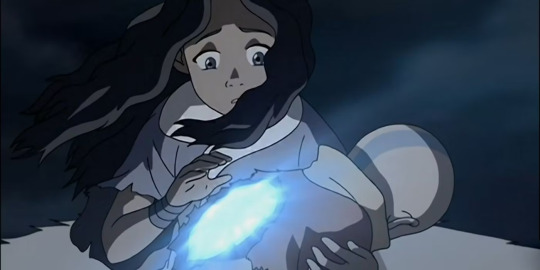
... could've been used on Zuko and he might've joined Azula anyway...
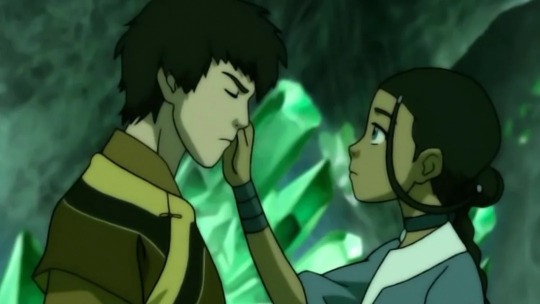
... meaning that Aang most likely would've died that night, if she made that choice...
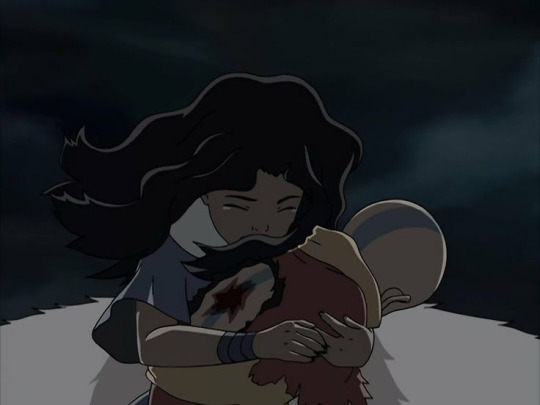
... and she probably thought about that a LOT while Aang was in his coma...
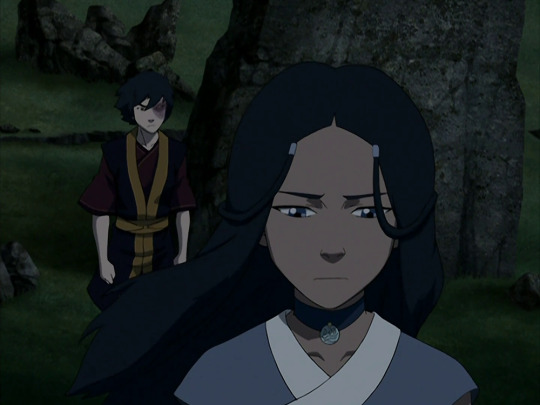
... it's no wonder it took her the longest to forgive Zuko.
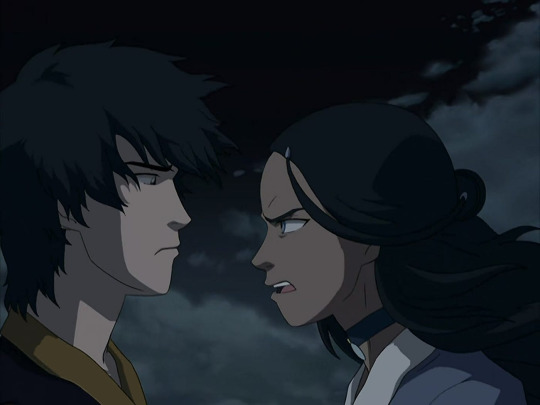
514 notes
·
View notes
Text
Hey so can we like stop with the "Zutara is for the girls and Kataang is for the boys" thing. It's silly and it's breakdancing just on the edge of gender essentialism.
The assumption that there is something inherent to Zutara that appeals predominantly to women and Kataang that appeals predominantly to men is dishonest because every ship can have appeal to all genders.
The discussion of the "female gaze" in Zutara and the "male gaze" in Kataang is also redundant. I enjoy dissecting the concept of "the gaze", however it is important to note that the "female gaze" doesn't have a set definition or grouping of conventions it adheres to. Lisa French, Dean of RMIT University’s School of Media and Communication says:
“The female gaze is not homogeneous, singular or monolithic, and it will necessarily take many forms... The aesthetic approaches, experiences and films of women directors are as diverse as their individual life situations and the cultures in which they live. The "female' gaze” is not intended here'to denote a singular concept. There' are many gazes."
Now excuse me as I put on my pretentious humanistics student hat.
Kataang's appeal to women and the female gaze
Before I start, I want to note that the female gaze is still a developing concept
There are very few female film directors and writers, and most of them are white. The wants and desires of women of colour, the demographic Katara falls into, are still wildly underepresented. Additionally, the concept of the female gaze had many facets, due to it being more focused on emotional connections rather than physical appearance as the male gaze usually is. Which means that multiple male archetypes fall into the category of "for the female gaze".
The "female gaze" can be best described as a response to the "male gaze", which was first introduced by Laura Mulvey in her paper: "Visual Pleasure and Narrative Cinema" , however the term "male gaze" itself was not used in the paper.
Mulvey brought up the concept of the female character and form as the passive, objectified subject to the active voyeuristic male gaze, which the audience is encouraged to identify, usually through the male character.
To quote her:
"In a world ordered by sexual imbalance', pleasure' in looking has been split between active'/male' and passive/female'. The determining male gaze' projects its fantasy onto the female' figure', which is styled accordingly."
Mulvey also brings up the concept of scopopfillia (the term being introduced by Freud), the concept of deriving sexual gratification from both looking and being looked at. This concept has strong overtones of voyeurism, exhibitionism and narcissism, placing forth the idea that these overtones are what keeps the male viewer invested. That he is able to project onto the male character, therefore being also able to possess the passive female love interest.
However, it's important to note that Mulvey's essay is very much a product of its times, focused on the white, heterosexual and cisgender cinema of her time. She also drew a lot of inspiration from Freud's questionable work, including ye ole penis envy. Mulvey's paper was groundbreaking at the time, but we can't ignore how it reinforces the gender binary and of course doesn't touch on the way POC, particularly women of colour are represented in film.
In her paper, Mulvey fails to consider anyone who isn't a white, cis, heterosexual man or woman. With how underrepresented voices of minorities already are both in media and everyday life, this is something that we need to remember and strive to correct.
Additionally Mulvey often falls into gender essentialism, which I previously mentioned at the beginning of this post. Funny how that keeps coming up
"Visual Pleasure and Narrative Cinema" started a very interesting and important conversation, and I will still be drawing from certain parts of it, however huge swathes of this text have already become near archaic, as our culture and relationship with media evolves at an incredible pace.
And as filmaking evolves, so does our definition of the male and female gaze. So let's see what contemporary filmakers say of it.
In 2016, in her speech during the Toronto International Film Festival , producer of the TV series Transparent, Jill Soloway says:
“Numero uno, I think the Female Gaze is a way of “feeling seeing”. It could be thought of as a subjective camera that attempts to get inside the protagonist, especially when the protagonist is not a Chismale. It uses the frame to share and evoke a feeling of being in feeling, rather than seeing – the characters. I take the camera and I say, hey, audience, I’m not just showing you this thing, I want you to really feel with me.
[Chismale is Soloway's nickname for cis males btw]
So the term "female gaze" is a bit of a misnomer, since it aims to focus on capturing the feelings of characters of all genders. It's becoming more of a new way of telling stories in film, rather than a way to cater to what white, cisgender, heterosexual women might find attractive in a man.
Now, Aang is the decided protagonist of the show, however, Atla having somewhat of an ensemble cast leads to the perspective shifting between different characters.
In the first episode of atla, we very much see Katara's perspective of Aang. She sees him trapped in the iceberg, and we immediately see her altruism and headstrong nature. After she frees Aang, we are very much first subjected to Katara's first impressions of him, as we are introduced to his character. We only see a sliver of Aang's perspective of her, Katara being the first thing he sees upon waking up.
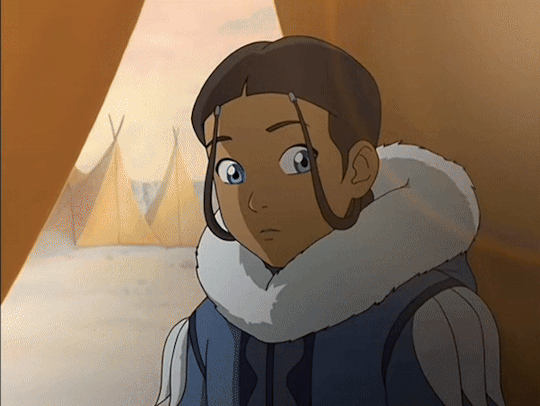
We see that she is intrigued and curious of him, and very excited about his presence. She is endeared and amused by his antics. She is rediscovering her childish side with his help. She is confiding in him about her own trauma surrounding the Fire Nation's genocide of the Southern Waterbenders. She is willing to go against her family and tribe ans leave them behind to go to the Northern Water Tribe with Aang. We also see her determination to save him when he is captured.
As the show moves on and the plot kicks into gear, we do shift more into Aang's perspective. We see his physical attraction to her, and while we don't see Katara's attraction quite as blatantly, there are hints of her interest in his appearance.

This is where we get deeper into the concept of Aang and Katara's mutual interest and attraction for one another. While her perspective is more subtle than most would like, Katara is not purely an object of Aang's desire, no more than he is purely an object of her desire.
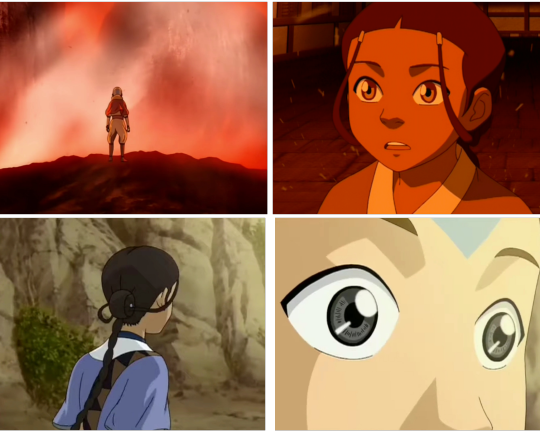
When analysing this aspect of Katara and Aang's relationship, I couldn't help but be reminded of how Célene Sciamma's Portrait of a lady on fire (in my personal opinion, one of the best studies of the female gaze ever created) builds up its romance, and how it places a strong emphasis on the mutuality of the female gaze.
Portrait of a lady on fire's cinematography is very important to the film. We see the world through the perspective of our protagonist, a painter named Marianne. We also see her love interest, Héloïse, the woman whom she is hired to paint a portrait of, through Marianne's lense.
We see Marianne analyse Héloïse's appearance, her beauty. We look purely through Marianne's eyes at Héloïse for a good part of the movie, but then, something unexpected happens. Héloïse looks back. At Marianne, therefore, in some way, also at the audience. While Marianne was studying Héloïse, Héloïse was studying Marianne.
We never shift into Héloïse's perspective, but we see and understand that she is looking back at us. Not only through her words, when she for example comments on Marianne's mannerisms or behaviours, but also hugely through cinematography and acting of the two amazing leads. (Noémie Merlant as Marianne and Adèle Haenel as Héloïse. They truly went above and beyond with their performances.)
This is a huge aspect of the female gaze's implementation in the film. The camera focuses on facial expressions, eyes and body language, seeking to convey the characters' emotions and feelings. There's a focus on intense, longing and reciprocated eye contact (I have dubbed this the Female Gays Gaze.). The characters stand, sit or lay facing each other, and the camera rarely frames one of them as taller than the other, which would cause a sense of power imbalance.
The best way to describe this method of flimaking is wanting the audience to see the characters, rather than to simply look at them. Sciamma wants us to empathise, wants us to feel what they are feeling, rather than view them from a distance. They are to be people, characters, rather than objects.
Avatar, of course, doesn't display the stunning and thoughtful cinematography of Portrait of a Lady on Fire, and Katara and Aang's relationship, while incredibly important, is only a part of the story rather than the focus of it.
However, the 'Kataang moments' we are privy to often follow a similar convention to the ones between Marianne and Héloïse that I mentioned prior.
Theres a lot of shots of Katara and Aang facing each other, close ups on their faces, particularly eyes, as they gaze at one another.
Katara and Aang are often posited as on equal grounds, the camera not framing either of them as much taller and therefore more powerful or important than the other. Aang is actually physically shorter than Katara, which flies in the face in usual conventions of the male fantasy. (I will get to Aang under the male gaze later in this essay)
And even in scenes when Aang is physically shown as above Katara, particularly when he's in the Avatar state, Katara is the one to pull him down, maintaining their relationships as equals.
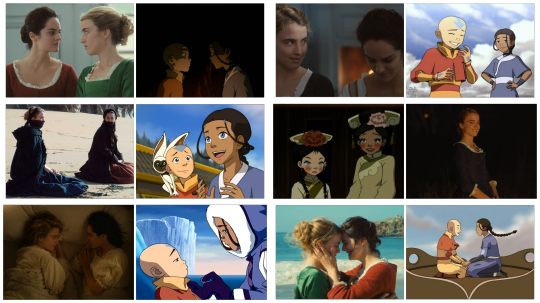
Despite most of the show being portrayed through Aang's eyes, Katara is not a passive object for his gaze, and therefore our gaze, to rest upon. Katara is expressive, and animated. As an audience, we are made aware that Katara has her own perspective. We are invited to take part in it and try to understand it.
Not unlike to Portrait of a Lady on Fire, there is a lot of focus placed on mannerisms and body language, an obvious example being Katara often playing with her hair around Aang, telegraphing a shy or flustered state. We also see her express jealousy over Aang, her face becoming sour, brows furrowed. On one occasion she even blew a raspberry, very clearly showing us, the audience, her displeasure with the idea of Aang getting attention from other girls.
Once again, this proves that Katara is not a passive participant in her own relationship, we are very clealry shown her perspective of Aang. Most of the scenes that hint at her and Aang's focus on their shared emotions, rather than, for example, Katara's beauty.
Even when a scene does highlight her physical appearance, it is not devoid of her own thoughts and emotions. The best example of this being the scene before the party in Ba Sing Se where we see Katara's looking snazzy in her outfit. Aang compliments her and Katara doesn't react passively, we see the unabashed joy light up her face, we can tell what she thinks of Aang's comment.
In fact, the first moment between Katara and Aang sets this tone of mutual gaze almost perfectly. Aang opens his eyes, and looks at Katara. Katara looks back.
There is, once again, huge focus on their eyes in this scene, the movement of Aang's eyelids right before they open draws out attention to that part of his face. When the camera shows us Katara, is zooms in onto her expression as it changes, her blinking also drawing attention to her wide and expressive eyes.

This will not be the first time emphasis is placed on Katara and Aang's mutual gaze during a pivotal moment in the show. Two examples off the top of my head would be the Ends of B2 and B3 respevtively. When Katara brings Aang back to life, paralleling the first time they laid eyes on one another. And at the end of the show, where their gaze has a different meaning behind it.
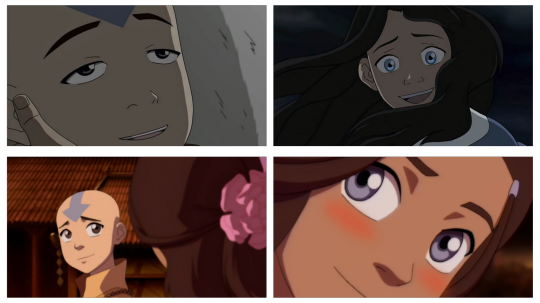
We see Katara's emotions and her intent telegraphed clearly in these instances.
In Book 1, we see her worry for this strange bald boy who fell out of an iceberg, which melts away to relief and a hint of curiosity once she ascertains that he isn't dead.
In B2 we once again see worry, but this time it's more frantic. Her relationship with Aang is much dearer to her heart now, and he is in much worse shape. When we see the relief on her face this time, it manifests in a broad smile, rather than a small grin. We can clearly grasp that her feelings for Aang have evolved.
In B3, we step away from the rule because Aang isn't on the verge of death or unconsciousness for the first time. It is also the first time in a situation like this that Aang isn't seeing Katara from below, but they are on equal footing. I attribute this to symbolising change of pace for their relationship.
The biggest obstacle in the development of Katara and Aang's romance was the war, which endangered both their lives. Due to this, there was a hesitance to start their relationship. In previous scenes that focused this much on Aang and Katara's mutual gaze, Aang was always in a near dead, or at least 'dead adjacent' position. This is is a very harsh reminder that he may very well die in the war, and the reason Katara, who has already endured great loss, is hesitant to allow her love for him to be made... corporeal.
However, now Aang is standing, portraying that the possibily of Katara losing him has been reduced greatly with the coming of peace, the greatest obstacle has been removed, and Katara is the one to initiate this kiss.
Concurrently, Katara's expression here does not portray worry or relief at all, because she has no need to be worried or relieved. No, Katara is blushing, looking directly at Aang with an expression that can be described as a knowing smile. I'd argue that this description is accurate, because Katara knows that she is about to finally kiss the boy she loves.
Ultimately, Katara is the one who initiates the kiss that actually begins her and Aang's romantic relationship.
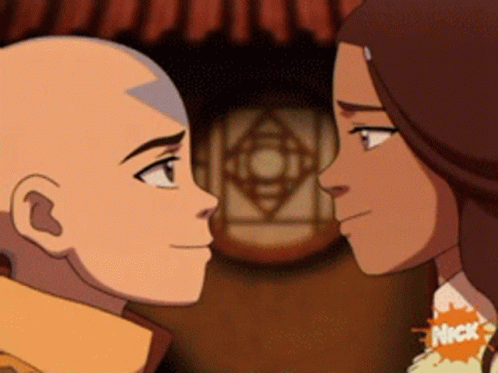
Kataang's appeal to women is reflected in how Katara is almost always the one to initiate physical affection with Aang. With only 3 exceptions, one of which, the Ember Island kiss being immediately shown by the narrative as wrong, and another being a daydream due to Aang's sleep deptivation. The first moment of outwardly romantic affection between Aang and Katara is her kissing his cheek. And their last kiss in the show is also initiated by Katara.
I won't falsely state that Kataang is the perfect representation of the female gaze. Not only because the storyline has its imperfections, as every piece of media has. But also because I simply belive that the concept of the female gaze is too varied and nebulous to be fully expressed. With this essay, I simply wanted to prove that Kataang is most certainly not the embodiment of catering to the male gaze either. In fact it is quite far from that.
The aspects of Kataang that fall more towards embodying the female gaze don't just appeal to women. There's a reason a lot of vocal Kataang shippers you find are queer. The mutual emotional connection between Katara and Aang is something we don't have to identify with, but something we are still able to emphasise with. It's a profound mutual connection that we watch unfold from both perspectives that sort of tracends more physical, gendered aspects of many onscreen romances. You just need to see instead of simply look.
✨���Bonus round✨️
Aang under the gaze
This started off as a simple part of the previous essay, however I decided I wanted to give it it's own focus, due to the whole discourse around Aang being a wish-fullfilling self insert for Bryke or for men in genral. I always found this baffling considering how utterly... unappealing Aang is to the male gaze.
It may surprise some of you that men are also subjected to the male gaze. Now sadly, this has nothing to do with the male gaze of the male gays. No, when male characters, usually the male protagonist, are created to cater to the male gaze, they aren't portrayed as sexually desirable passive objects, but they embody the active/masculine aide of the binary Laura Mulvey spoke of in the quote I shared at the beginning of this essay.
The protagonist under the male gaze is not the object of desire but rather a character men and boys would desire to be.
They're usually the pinnacle of traditional, stereotypical masculinity.
Appearance wise: muscular but too broad, chiseled facial features, smouldering eyes, depending on the genre wearing something classy or some manner of armour.
Personalitywise they may vary from the cool, suave James Bond type, or a more hotblooded forceful "Alpha male" type. However these are minor differences in the grand scheme of things. The basis is that this protagonist embodies some manner of idealised man. He's strong, decisive, domineering, in control, intimidating... you get the gist. Watch nearly any action movie. There's also a strong focus placed on having sway or power over others. Often men for the male gaze are presented as wealthy, having power and status. Studies (that were proved to be flawed in the way the data was gathered, I believe) say that womem value resources in potential male partners, so it's not surprising that the ideal man has something many believe would attract "mates". [Ew I hated saying that].
Alright, now let's see how Aang holds up to these standards.

Well... um...
Aang does have power, he is the Avatar. However, he is often actually ignored, blown off and otherwise dismissed, either due to his age or his personality and ideals being seen as unrealistic and foolish. Additionally, Aang, as a member of a culture lost a century ago, is also often posited as an outsider, singled out as weak, his beliefs touted as the reason his people died out and.
Physically, Aang doesn't look like the male protagonist archetype, either. He isn't your average late teens to brushing up against middle aged. Aang is very much a child and this is reflected in his soft round features, large eyes and short, less built body. This is not a build most men would aspire to. Now, he still has incredible physical prowess, due to his bending. But I'm not sure how many men are desperate to achieve the "pacifist 12 year old" build to attract women.
Hailing from a nation that had quite an egalitarian system, Aang wouldn't have conventional ideas surrounding leadership, even if he does step up into it later. He also has little in the way of possessions, by choice.
As for Aang's personality, well...

I mean I wouldn't exactly call him your average James Bond or superhero. Aang is mainly characterised through his kindness, empathy, cheerful nature and occasional childishness (which slowly is drained as the trauma intesifies. yay.)
Aang is very unwilling to initiate violence, which sets him aside from many other male protagonists of his era, who were champing at the bit to kick some ass. He values nature, art, dance and fun. He's in tune with his emotions. He tries to desecalate situations before he starts a fight.
Some would say many of Aang's qualities could be classified as feminine. While the other main male characters, Zuko and Sokka try to embody their respective concepts of the ideal man (tied to their fathers), Aang seems content with how he presents and acts. He feels no need to perform masculinity as many men do, choosing to be true to his emotions and feelings.
These "feminine" qualities often attract ridicule from other within the show. He is emasculated or infantiliased as a form of mockery multiple times, the most notable examples being the Ember Island play and Ozai tauntingly referring to him as a "little boy". Hell, even certain Aang haters have participated in this, for example saying that he looks like a bald lesbian.
I'd even argue that, in his relationships with other characters, Aang often represents the passive/feminine. Especially towards Zuko, Aang takes on an almost objectified role of a trophy that can be used to purchase Ozai's love. [Zuko's dehumanisation of others needs to be discussed later, but it isn't surprising with how he was raised and a huge part of his arc is steerring away from that way of thinking.]
Aang and Zuko almost embody certain streotypes about relationships, the forceful, more masculine being a literal pursuer, and the gentler, more feminine being pusued.
We often see Aang framed from Zuko's perspective, creating something akin to the mutual gaze of Katara and Aang, hinting at the potential of Zuko and Aang becoming friends, a concept that is then voiced explicitly in The Blue Spirit.
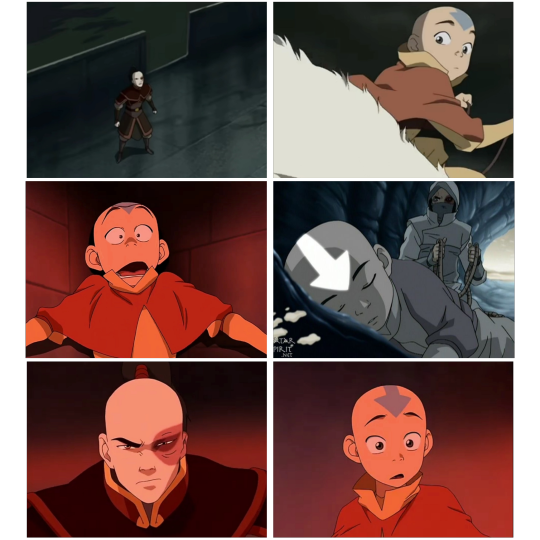
However, unlike Katara, Zuko is unable to empathise with Aang at first, still seeing Aang as more of an object than a person. We have here an interesting imbalance of Aang seeing Zuko but Zuko meerly looking at Aang.
There is a certain aspect of queer metaphor to Zuko's pursuit of Aang, but I fear I've gotten off topic.
Wrapping this long essay up, I want to reiterate that I'm not saying that Zutara isn't popular with women. Most Zutara shippers I've encountered are women. And most Kataang shippers I've encountered are... also women. Because fandom spaces are occupied predominantly by women.
I'm not exactly making a moral judgement on any shippers either, or to point at Kataang and go: "oh, look girls can like this too. Stop shipping Zutara and come ship this instead."
I want to point out that the juxtaposition of Zutara and Kataang as respectively appealing to the feminine and masculine, is a flawed endeavour because neither ship does this fully.
The concept of Kataang being a purely male fantasy is also flawed due to the points I've outlied in this post.
Are there going to be male Kataang shippers who self insert onto Aang and use it for wish fulfilment? Probably. Are there going to be male Zutara shippers who do the same? Also probably.
In the end, our interpretation of media, particularly visual mediums like film are heavily influenced by our own biases, interests, beliefs andmost importantly our... well, our gaze. The creators can try to steer us with meaningful shots and voiced thought, directing actors or animating a scene to be a certain way, but ultimately we all inevitably draw our own conclusions.
A fan of Zutara can argue that Kataang is the epitome of catering to the male gaze, while Zutara is the answer to women everywhere's wishes.
While I can just as easily argue the exact opposite.
It really is just a matter of interpretation. What is really interesting, is what our gaze says about us. What we can see of ourselves when the subject gazes back at us.
I may want to analyse how Zutara caters to the male gaze in some instances, if those of you who manage to slog through this essay enjoy the subject matter.
#ok getting off my soapbox#i forgot how much i love to write these long sprawling essays...#kataang#pro kataang#aang#pro aang#aanglove#aang defense squad#pro katara#katara defense squad#kataang love#zuko#avatar#atla#avatar: the last airbender#the last airbender#avatar the last airbender#aang the last airbender#anti zutara
461 notes
·
View notes
Text
They could never make me hate Maiko when Mai was willing to die for him and Zuko looks like a dopey puppy every time she is involved and Mai will let her walls down around him and Zuko is the only one who can earnestly make her laugh and Mai threw mud at him when they were kids and Zuko was so ready to jump to her defense when Azula lit a apple on fire on her head and Mai can touch his scar like it’s not even there and Zuko thinks she’s so beautiful when she hates the world and Mai trusts him so implicitly that she’d betray her nation, friends, and family for him and Zukos only regret when leaving the fire nation was also leaving her and Mai tries her hardest to work past her own issues to support him in his struggles and Zuko genuinely loves it when she expresses herself and Mai who doesn’t like hugs will be so cuddly and touchy only with him and Zuko knows she doesn’t need anyone to protect her and Mai loves him more than she fears Azula…
Maiko the ship that you are… they could never make me hate you
#jadey speaks#atla#avatar the last airbender#maiko#atla maiko#mai x zuko#zuko x mai#zumai#pro maiko#maiko defense squad#Mai defense squad#pro mai#genuinely I don’t think people realize just how romantic they actually are#atla mai#atla zuko
595 notes
·
View notes
Text
Aang, he’s just better than Zuko.
For Katara anyway.

Frankly even in Book 3, the season where Zuko was at his best, Aang was still kinder and more altruistic than Zuko.


In Sozin’s Comet (Part 1) both Aang and Zuko are driven to a rage breaking point due to the stress of the comet approaching and the others not taking the situation seriously enough, the others want to have fun at the beach while Zuko is concerned about Ozai’s genocidal plan, whereas Aang is concerned about having to kill Ozai, something the others don’t fully understand. Zuko gets violent and destructive, burning everything and attacking Aang to “teach him a lesson”, while Aang is genuinely angry which is verbally directed at the others (even Katara who trying to help), and so he leaves the situation to think out his dilemma. Guess who gets more flack from that side of the “fandom”.


You cannot convince me that Aang hating Zutara weirdos genuinely think Zuko is a kinder person than Aang simply because he learned familial abuse, violence, imperialism and colonialism were wrong and sought to improve himself. Or that he’s more mature than Aang for those same reason and because he’s less joyful. Zuko’s always been rather temperamental, even post-redemption arc.
They like Zutara for superficial reasons, nothing more. All of their media-illiterate “reasons” is amounts to nothing but misunderstanding The Southern Raiders.
These people will say Zuko is the only who supported and understood Katara. Lemme set the record straight, Zuko does a total of three significant “supportive” things for Katara, that’s it.


He has one moment of empathy when she mentions her mother dying in the cave, which is nice. She considers healing his wound and he ends betraying her. The way the Zutara shippers go on, you’d think they kissed in the cave like Oma and Shu.

Oh, wait.

Not only that but Zuko himself never reflects back on that moment with any remorse, he never apologizes to Katara, if anything HE gets annoyed when Katara is rightfully pissed off at him much later. Zuko is “the only one who understands Katara” right.
Anti-Aang Zutara morons LOVE to bring up Zuko taking Katara to confront Yon-Rha as if it’s the nicest thing anyone’s ever done for Katara as if it’s the only time Katara was ever cared for.

HOLY GLAZE BATMAN!
The MAIN reason Zuko did was specifically because he wanted Katara to stop hating him. He isn’t concerned about this will affect Katara about what choices she’s gonna make when she confronts this guy, or even if Sokka wants to tag along (he was kinda sidelined despite Kya being HIS MOM too).

Both Aang and Sokka are concerned for Katara not because “they idealize her.” They’ve known Katara the longest, They saw her break down when bloodbending, they don’t want her to do something that will mentally break her later on.


The only time Zuko shows genuine support and kindness in the episode is when he checks on Katara when she’s in control of Appa and when he hears exactly what happened to her mom, he shows genuine sympathy and understanding.
Cool. But this ONE moment in no way means he’s the only person who supports Katara.

He also saves her from Azula’s lightning. Great, really shows how far Zuko’s come as a person. But saving Katara’s life isn’t something exclusive to Zuko. Aang saved Katara too many times, just as she did for him.
Objectively speaking, Aang DOES support Katara, more times than Zuko.

If taking Katara somewhere is so very important (in regard to her tribe’s colonization no less), in the first darn episode Aang willingly agrees to take her to the North Pole to learn Waterbending. He’s nothing but supportive to Katara in regards to her Waterbending, supporting her in moments of insecurity, refusing to learn from someone who’s openly discriminatory to Katara and cheers her on when fighting the discriminator.


He goes out of his way for Katara several times throughout the series, going through hell and high water to get frozen frogs to cure Katara’s illness, securing her lost necklace which he knows is important to her culture, surrenders himself to Zuko so that he’ll leave Katara’s tribe, helps her commit eco-terrorism when she masquerades as the Painted Lady, inviting her to dance when she feels left out, leaving the Guru specifically to save HER, etc.

If it wasn’t clear already Aang cares about Katara emotionally, he calls her Sifu when she points out he’s never done so before, when he walls himself off from his emotions, much to Katara’s dismay, he later tells Katara that she was right about not losing sight of hope and his feelings (especially for Appa and for her) which she greatly moves her, when Jet died and Katara was forced to bloodbend Aang comforted her, simply by placing his hand on her shoulder, letting her know he was there, which she appreciated.

It’s thanks to Aang that Zuko even joined their team at all and even then, he specifically asks Katara if it’s okay (seeing as she feels so strongly about it) and she only agrees to go through with it because of Aang, which he appreciates.
People use The Southern Raiders as an example of Aang not understanding Katara, when if anything, it’s the opposite.


Aang himself knows what it’s life to feel “rage and pain” and appeals to Katara by brining up times he not only felt grief loosing his entire nation, his father figure, and Appa, the only living thing from his time and culture, all of which Katara comforting Aang over this by relating her own grief to his. Both have lost people they care about to the Fire Nation, both are kind people who once let themselves be driven by rage and pain, both are the last benders of their tribe. Even with Aang being concerned for Katara, he doesn’t invalidate her anger, he encourages her to confront her oppressor and even though she doesn’t forgive him, he accepts this.

In addition to everything else, Aang and Katara simply just bring out the best in each other, they’re friends first, they have fun together (penguin sledding started it all), they both have each other backs, they work extremely well together in combat as a battle couple, they both care deeply about the other and while the both admire each other strongly, they have an equal partnership and love each other flaws and all.
With all that said, can you really say Zuko was the only one who supported and understood Katara, because (aside from The Southern Raiders) he didn’t do anything super significant and factually speaking Aang clearly understood and supported Katara more than Zuko ever did.

Heck, even Sokka who was initially rather rude and dismissive of Katara in the first episode did more for Katara than Zuko as the show went on. Supporting her desire to save Aang in Episode 2, supporting her saving Haru, throwing hands with Aang when the later burned her, comforting her when she was sad about Aang’s capture at the North Pole, acknowledging how much Katara did for him when their mom died, purely so Toph would leave her alone, he was was good brother.
The Zutara brigade will cling to three moments where Zuko did anything for Katara because of the #aesthetic of their mid ship. Meanwhile they act like Aang not only did anything for Katara, but treated her like garbage, by naming three moments, all of which he either apologized for or realized he was wrong.
They only like the idea of Zutara in their Wattpad fanfics, as opposed to what Zuko and Katara’s relationship actually is and no matter how many times they deny it, it’s primarily based on aesthetic and superficial reasons.

If Aang was 16 like Zuko, they’d lap up all those Kataang moments like crazy, even Aang kissing Katara in EIP (which was bad) given how much they love Zuko kidnapping Katara (I’ll save you from the pirates).

If Zuko was 12 like Aang, Zutara wouldn’t even be a thing, especially by how immature and quick to anger Zuko is for a good chunk of the show. They’d see Katara try to heal Zuko and think “it’s a mom caring for her child”, they’d see Zuko get mad at Katara for not trusting him and see Zuko throw a fiery, violent tantrum at Aang in Sozin’s Comet and say “he’s way too immature to be with Katara”.
The hypocrisy snd double standards of these morons are insane.
Shipping obsessed fake A:TLA fans is what they are. Nothing more.

#kataang#a:tla#atla#avatar: the last airbender#anti zutara#pro kataang#aang#aang x katara#katara#anti zutara stans#anti zutara shippers#pro aang#pro katara#atla fandom problems#atla fandom critical#kataang defense squad#aang and katara#zuko critical#anti zuko stans#katara deserved better#katara deserves a better fandom
86 notes
·
View notes
Text

Quick Aang doodle ☀️🧡
#atla#avatar the last airbender#avatar#avatar creator#atla fanart#bun draws#aang fanart#atla aang#avatar aang#aanglove#aang#avatar art#avatar the legend of aang#avatar fanart#aang defense squad#aang wholesome#zuko#avatar zuko#atla zuko#katara#toph#sokka#azula#avatar the last airbender aang
222 notes
·
View notes
Text





I don’t get this Kataang fan, even when they defend the choice for Katara to not easily forgive Zuko, they turn this into a rant against Zutara. I am a Zutara fan who was cool with Katara taking a while to forgive Zuko. Then this thing about his Zuko was terrible towards Mai, but still wants to ship them together. To me they were both toxic towards each other which is why I don’t want them together. But to them acknowledging that and the fact that Zuko was abused was coddling Zuko. Then if you disagree with them they will get offended especially if you point out that they don’t like Zuko because they never say anything positive about him.
#avatar the last airbender#atla#tired of this shit#anti kataang#anti maiko#zuko defense squad#both zuko and mai were toxic towards each other
45 notes
·
View notes
Text
'Zutara should've happened to subvert the 'hero always gets the girl' trope!!!''Bad boy always gets the girl' is also a trope and one with significantly more misogynistic history than the hero one.Kataang itself is a subversion of how it's usually potrayed to make it feminist with specific writing points to switch up the gender dynamics and thus defy gender roles and sexist stereotypes,including that Katara is also the hero of Atla as much as Aang is,while Zutara calls for the bad boy one to be played straight in a classic faux-feminism move and false attempt at challenging cisheteronormativity.Also Zuko wouldn't have gotten Katara a statue 'unlike Aang' not just because he canonically didn't but also because she would never want one and there is no evidence to suggest she would nor that she finds manliness on men attractive nor that she's a preppy good girl nor that she enjoys playing into maternal roles to anybody except her actual kids or sees Aang as her son nor that she hates other girls her age nor that Zuko wants to burden his girlfriend with all his emotional problems nor be a 'female fantasy' for any girl instead of his girlfriend's boyfriend👍🏼Projecting is for film and y'all're M.Night Shyamalan
#anti zutara#katara#zuko#kataang#pro kataang#t4t kataang#kataang defense squad#aang#mai atla#ty lee#azula#jin atla#song atla#punk katara#bi katara#autistic katara#trans katara#mermaidkin katara#anti momtara#suki atla#dadko#trans zuko#autistic zuko#disabled zuko#goth zuko#dad bod zuko#pro maiko#pro ty luko#atla geekery#summerposting
113 notes
·
View notes
Text
In Defense of Aang in "The Southern Raiders"
A while ago, while still shipping Zutara, I made a meta saying Aang was careless with how he treated Katara in The Southern Raiders. Since then my opinion has changed, and I want to give my updated thoughts on the matter.
Fans give Aang flak for three main things:
"Preaching" forgiveness at a sensitive time.
Comparing the loss of Kya to him losing Appa.
Comparing Katara to Jet.
Let us go through each of those points and refute them one by one.
1. "Preaching" forgiveness at a sensitive time
Aang's goal in The Southern Raiders is to help Katara heal in the way that's right for her. It's a noble goal. And he believes that forgiveness is this way to heal. That's why he talks about forgiveness. Not for her mother's killer's sake, but for her own. He demonstrates this when Katara says that she didn't kill Yon Rha. He simply accepts that she did what's right for her with no actual regard to his principles of forgiveness.
In my previous - and outdated - post on the subject, I stated that Aang's lines feel preachy because they are impersonal. But they are not impersonal. Aang is, in fact, repeating the words of Katara herself to her in hopes of changing her mind. That is deeply personal.

2. Comparing the loss of Kya to him losing Appa
Let's take another look at the parallel between Katara's words and Aang's. Katara is saying these lines in "The Avatar State" in hopes of trying to get Aang to give up trying to enter the Avatar State. In The Southern Raiders, Aang references her words and then compares her loss to losing Appa. What do "The Avatar State" and losing Appa have in common? When Aang lost Appa, he entered the Avatar State. That's why he's comparing the two instances. Because he's bringing up her words when they were discussing the Avatar State.
3. Comparing Katara to Jet
As I previously established, Aang's motivation in this episode was to help Katara. She is at heart a kind soul, and killing Yon Rha would have a devastating effect on her. Aang invokes Jet because this recent loss might get to her and convince her to change her mind. He has to, by any means necessary. Now, Aang didn't compare Katara to Jet because they're both mad. He compared the two because Jet's life were ultimately tragic. He was so consumed by rage and hatred and it ate him inside, preventing him from finding normalcy in Ba Sing Se. And he could only change once he died. Katara too wouldn't be able to find normalcy after commiting such act, which is why their situations are comparable.
Before we wrap this up, I want to remind y'all that even Zuko admitted that Aang was right in the end.

Thank you for reading.
#aang meta#pro aang#aang defense squad#in defense of aang#aang#atla aang#avatar aang#katara#zuko#ty lee#sokka#toph beifong#toph#mai#azula#the southern raiders#atla#avatar the last airbender#avatar: the last airbender#kataang#anti zutara#pro kataang#atla meta#a:tla
95 notes
·
View notes
Text
Zuko thoughts:
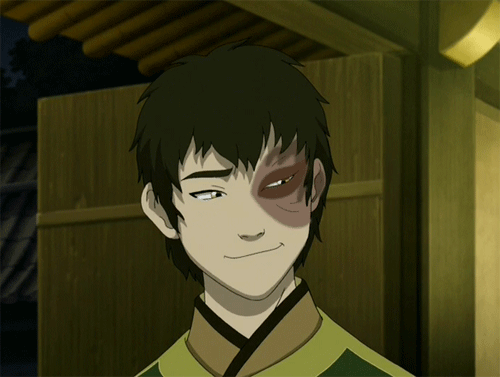
Song that makes me think of Zuko and all the people he loves( Iroh, the gaang, which ever ship you have with zuko. My favorite is Zutara and Zukka) I'm a mess by Ed Sheeran
youtube


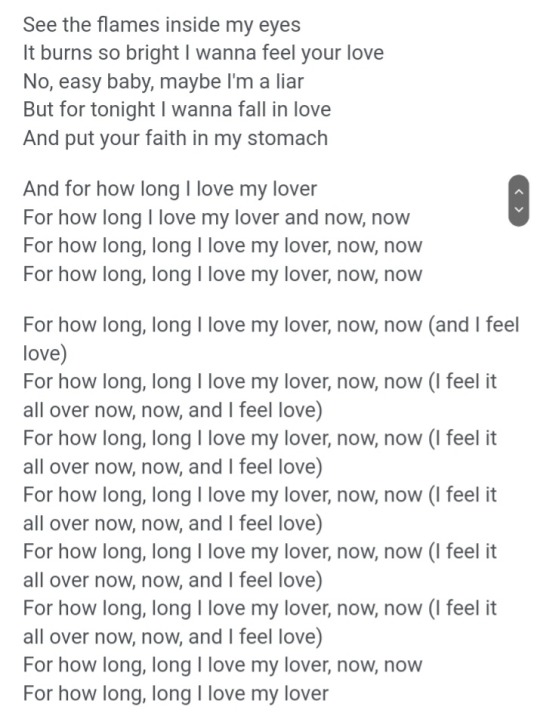
#Spotify#zuko#atla zuko#prince zuko#avatar the last airbender#atla#ed sheeran#i'm a mess#zuko defense squad#zuko deserves better#Youtube
1 note
·
View note